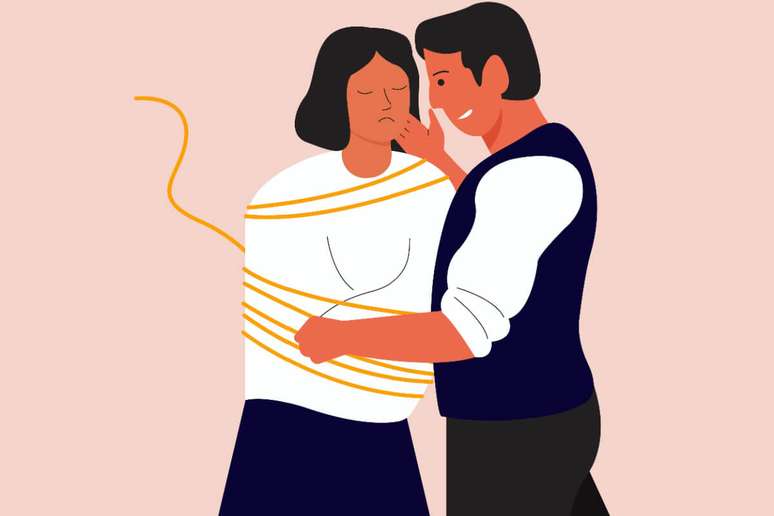Understanding the complexity of these factors is essential to offering the necessary support to those facing this problem
Conducted by the Brazilian Public Security Forum together with the Datafolha Institute, the fourth edition of the Visible and Invisible survey showed that 27.6 million Brazilian women (aged 16 and over) reported being victims of violence caused by an intimate partner over the years, while 18.6 million said they had suffered some type of violence or assault.
According to Claudia Petry, educator specialized in Clinical Sexology and specialist in Sexual Education at the Federal University of Santa Catarina (UFSC/SC), one of the triggers of this problem is a violent relationship.
“This is a model that is still widely studied, because behind this behavior there are a series of contexts. After all, no woman chooses to live a life destructive relationship“, says the specialist, member of SBRASH (Brazilian Society of Human Sexuality) and professor at the Institute of Parapsychology and Mental Sciences of Joinville (SC).
Signs of an abusive relationship
According to Bárbara Bastos, clinical and educational sexologist at FASEX, in a healthy relationship both partners cultivate affection, respect, trust, admiration, empathy, tolerance in the face of disagreements and, above all, effective and assertive communication.
“An abusive relationship devalues fundamental aspects such as self-esteemself-love, emotional balance and self-knowledge, as well as maintaining a completely harmful bond,” says Bárbara, a postgraduate student in Human Sexuality at the Child Behavior Institute in Miami.

Beginning of psychological violence
Psychologist Monica Machado, founder of Clínica Ame.C and graduate in Psychoanalysis and Mental Health from the Institute of Teaching and Research of the Albert Einstein Hospital, explains that change in this type of violent relationship can begin in a subtle way, like a critical behavior, the woman’s way of dressing, and progressively worsens, when the partner clearly demonstrates that he controls and persecutes the woman, with the intention of forcing her and making her submissive to him.
“This type of relationship also involves public humiliation. An example of this is the man’s disapproving attitude when the woman expresses her ideas during a meeting between friends or family. When they realize that the other person didn’t like it, the person feels intimidated, embarrassed and ends up keeping quiet and becoming apathetic. Worse still: fearing displeasure, he persists in justifying the other’s behavior to everyone,” she adds.
Distorted perception of the relationship
For psychiatrist Danielle H. Admoni, supervisor of the residency of the Federal University of São Paulo (UNIFESP/EPM) and specialist of the ABP (Brazilian Psychiatric Association), in this type of relationships, beliefs linked to insecurity and a sense of inferiority they may harbor a distorted perception of the relationship, with excessive idealization of the partner, including the thought that he or she will change.
According to her, it is often not easy to realize that the relation is changing, as the abuser often uses speech such as “I do this because I care about you” or “I am looking out for your well-being and safety.”
This behavior can be mistakenly perceived as love. “People end up exercising power over others, limiting their freedom, humiliating them, imposing their way of thinking and being, so that they end up losing part of their identity. When they reach this point of psychological and physical suffering, it is time to review the relationship,” reflects Danielle Admoni.

Relationship between complacency and fear
In addition to a woman’s individual problems, such as insecurity, feelings of inferiority, and the need to be with someone, many factors contribute to her staying in an abusive relationship.
“Some tend to believe that they won’t find someone else. There are also family or social pressures, emotional dependencefinancial dependence, fear of being exposed and even guilt, as the abuser often holds her responsible for her behavior”, says Bárbara Bastos.
Those who suffer this abuse “pretend” that they are used to it and prefer to continue like this rather than face the challenges that await them. “This adaptation may be linked to the personality of the person, who often feels fragile and, despite suffering abuse, feels protected by the other. A symbiotic relationship is thus created, in which one emotionally depends on the other, formalizing a process of lack of respect and submission, which is continually fueled”, explains Claudia Petry.
It’s time to ask for help
According to the Datafolha/FBSP survey, 72.4% of women feel the need to consult a mental health specialist, while 69.4% consider seeking legal support and services to guide them.
“When extremes of verbal and/or physical aggression are reached, the situation begins to require urgent behavioral change, starting with seeking treatment that aims to break the symbiotic relationship and seeking equity and balance. To achieve this, you must first recognize that it is an abusive relationship,” advises Claudia Petry.
Psychologist Monica Machado warns that, from the moment a woman becomes aware of her reality and needs to free herself from the vision she has of love and respect, it becomes easier to work on this distortion in therapy, managing to save her integrity physical, moral. and psychological.
“Once they leave the abusive relationship, it is important for women to strengthen themselves, develop self-knowledge and recognize what defines them. Love“, adds the host of podcasts Ame.Cast. The psychiatrist reiterates that, in the event of physical and/or psychological violence, it is essential to talk to someone you trust and seek professional help immediately.
“Many women are ashamed and prefer to remain silent. However, this wound can generate trauma and lead to serious mental disorders. Keeping it to themselves fuels the continuity of the situation, and not thinking that someone close to them could also be a victim one day”, she concludes Danielle Admoni.
Number 180, for example, is from the Women’s Service Center, a service created to combat violence against women.
By Flavia Vargas Ghiurghi
Source: Terra
Ben Stock is a lifestyle journalist and author at Gossipify. He writes about topics such as health, wellness, travel, food and home decor. He provides practical advice and inspiration to improve well-being, keeps readers up to date with latest lifestyle news and trends, known for his engaging writing style, in-depth analysis and unique perspectives.








